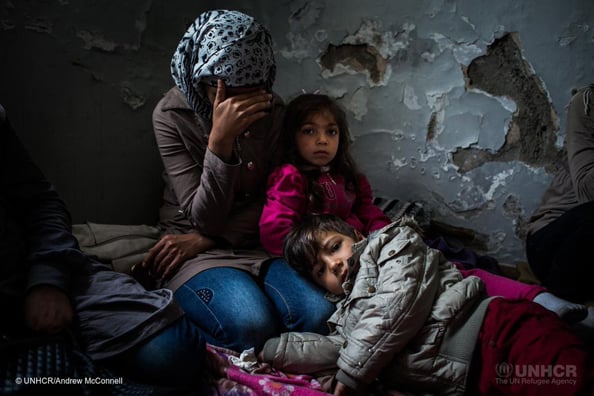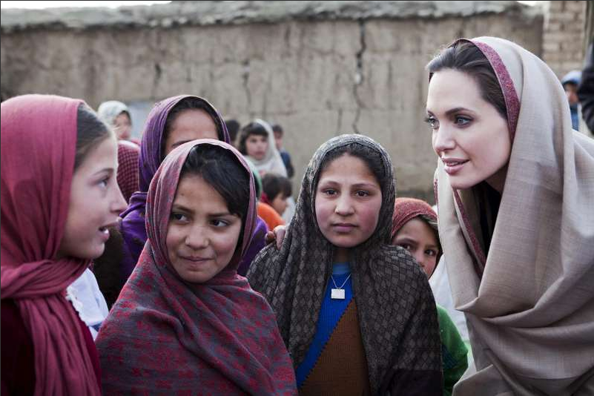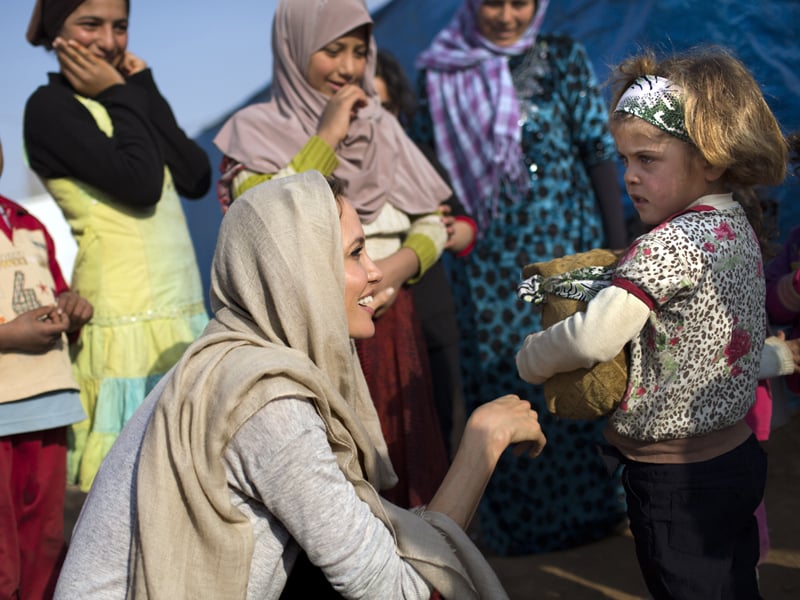As part of the fifth anniversary of the Syrian Civil War, Hollywood movie star Angelina Jolie came to the Middle East to say thank you to the citizens in Lebanon for helping refugees.
During her visit to Lebanon, UNHCR ambassador not only thanked the Lebanese people for helping to save the lives of over 1 million displaced Syrians, but was also reunited with Hala, a 13-year-old Syrian refugee she befriended in previous visits.
Hala lost her parents during the Syrian conflict and now lives in Lebanon with her sisters and brothers. Despite what is happening in her home country Hala told Jolie, who she first met in 2014, that she dreams of returning to Syria.
Related story: Angelina Jolie And Brad Pitt In The UAE
Inspired by Hala and the thousands, even millions, of children in a the same predicament, the 40-year-old mum of six delivered a passionate speech about the ongoing refugee crisis, imploring the leaders of the world to increase their support of the refugees on the fifth anniversary of the Syrian Civil War.
On Lebanon’s Efforts To Help
It is not easy for a country to take in the equivalent of a quarter of its own population in refugees. But for as much as it is a responsibility, I hope you are aware of the message it sends about the values and character and spirit of the Lebanese people.
You are setting an example to the world of generosity, humanity, resilience and solidarity. On behalf of UNHCR, and on my own behalf, shukran, thank you.

Angelina Jolie talks to Syrian refugees in Lebanon
On The Pressure In The Middle East
We should never forget that for all the focus on the refugee situation in Europe at this time, the greatest pressure is still being felt in the Middle East and North Africa, as it has for each of the last five years.
There are 4.8 million Syrian refugees in this region, and 6.5 million people displaced inside Syria. On this day, the 5th anniversary of the Syria conflict, that is where I had hoped I would be: in Syria, helping UNHCR with returns, and watching families I have come to know be able to go home.
It is tragic and shameful that we seem to be so far from that point.
Related Story: A Host Of Celebrities Rally To Support Syrian Refugees
On The Plight Of Syrian Refugees
Every Syrian refugee I have spoken to on this visit, without exception, talked of their desire to return home when the war is over and it is safe for them to do so – not with resignation, but with the light in their eyes of people dreaming of being reunited with the country that they love.
I have seen on this visit just how desperate the struggle to survive now is for these families. After five years of exile, any savings they had, have been exhausted. Many who started out living in apartments now cluster in abandoned shopping centres, or informal tented settlements, sinking deeper into debt.
The number of refugees in Lebanon living below the minimum threshold for survival – unable to afford the food and shelter they need to stay alive – has doubled in the last two years, in a country where 79 per cent of all Syrian refugees are women and children.
On Understanding The Tragedies
We have to understand the fundamental realities that are driving the global refugee crisis, which is the product not just of the Syria war, but of decades of open-ended conflicts or persecution: in Myanmar, Mali, the Central African Republic, the DRC, Nigeria, Somalia, South Sudan, Afghanistan, Yemen, Iraq, Syria. I could go on.
The number of refugees is now higher than the last time we had a World War.
Related Story: Malala Yousafzai Speaks On Behalf Of Syrian Refugees
On The Lack Of Capacity
In conventional times of war, people who are displaced go to more stable areas, or to neighbouring countries for sanctuary, or are provided for in refugee camps until it is safe to go home. In exceptional circumstances some are sent abroad for resettlement or asylum.
But with 60 million people displaced, as there are today, there is no way that the governments of the world – no matter how rich or willing they are – can prop up the UN enough to care for all these people permanently and expect that to address the problem.
We cannot manage the world through aid relief in the place of diplomacy and political solutions.

A Syrian refugee with her displaced family
On Taking Control
We have to focus on the absolute root causes, and that takes a certain amount of courage and leadership.
And in my view, leadership in this situation is about doing more than simply protecting your borders or simply putting forward more aid, it means taking decisions to ensure we are not heading towards an even greater refugee crisis in the future.
That is why, as heartbreaking and angering it is to hear the individual stories of the refugees, it is not a time for emotion.
It is a time for reason and calm and foresight.
On Peoples’ Fears Of Refugees
I understand that people in many different countries have fears about the refugee situation. They are worried about the impact on their communities, livelihoods and security if they accept refugees into their countries.
It is not wrong to feel unsettled faced by a crisis of such complexity and such magnitude. But we must not let fears get the better of us. We must not let fear stand in the way of an effective response that is in our long-term interests.
Related Story: The Plight Of Syrian Refugee Children
On The World Leaders Needing To Act Now
My plea today is that we need governments around the world to show leadership: to analyse the situation and understand exactly what their country can do, how many refugees they can assist and how, in which particular communities and to what timeframe; to explain this to their citizens and address fears – based not on emotion but on a measured assessment of what can and must be done to share the responsibility and get on top of this situation.
I appeal to all governments to uphold the UN Convention on Refugees and basic human rights law, because it is both necessary and possible to protect people fleeing persecution and death and protect citizens at home. It should not be reduced to a choice between one or the other.
We can do the right thing by refugees and build a more secure international environment. We can build order out of chaos.

Angelina Jolie works tirelessly with UNHCR. Here she meets schoolgirls in a village in Afghanistan
Images: Getty and UNHCR











